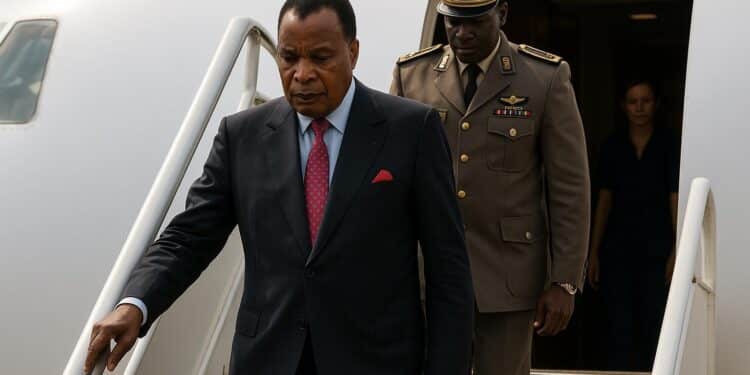Anniversary diplomacy shines
Arriving in Luanda on 10 November 2025, Congolese President Denis Sassou N’Guesso extended his intensive diplomatic tour from Belém to the Angolan capital, where the country is marking fifty years of independence with a ceremony designed to showcase both national pride and regional solidarity.
The golden-jubilee events, scheduled for 11 November, are being framed by Luanda as an opportunity to reaffirm Angola’s trajectory since 1975 while acknowledging the interdependence that binds it to neighbouring Republic of Congo in security, trade, energy and environmental management.
One-on-One talks cement partnership
President Sassou N’Guesso was welcomed at the Presidential Palace by Angolan head of state João Lourenço for a closed-door conversation described by aides as cordial, substantive and forward-looking, with a focus on updating the bilateral cooperation roadmap first articulated during the 2019 Brazzaville summit.
In public remarks, the two leaders reiterated their commitment to what they call a strategic axis connecting the Congo River Basin with the South Atlantic, emphasising coordinated patrols against piracy, harmonised customs procedures at the border of Cabinda, and joint advocacy within the Union Peace and Security Council.
Officials highlighted that the Congolese delegation includes ministers in charge of foreign affairs, hydrocarbons and finance, underscoring the multi-sector nature of the Luanda exchange and hinting at follow-up sessions on joint petroleum infrastructure and on carbon-credit monetisation in the Congo Basin forests.
Security and regional integration
Analysts in Brazzaville point out that Angola remains one of Congo’s top export destinations, with bilateral trade dominated by refined fuels shipped upriver and timber moving south by road; both governments have signalled an ambition to lift volumes substantially over the medium term.
Energy cooperation surfaced prominently, given Angola’s proven offshore reserves and Congo’s refining capacity at Pointe-Noire; negotiators confirmed that a memorandum on cross-border pipeline connectivity, first drafted in 2023, has been finalised for signature at the next joint commission later this year.
A senior Congolese diplomat, requesting anonymity, described the atmosphere in Luanda as ‘fraternal realism’, stressing that each country faces domestic pressures to deliver growth and jobs yet sees more opportunities in coordination than in competition.
Observers note that the two presidents have met seven times since 2020, a frequency unmatched among Central African leaders and widely interpreted as a signal of mutual trust, particularly significant as the Economic Community of Central African States prepares a new regional infrastructure masterplan.
Trade and infrastructure prospects
During the independence-day parade, President Sassou N’Guesso is scheduled to share the reviewing stand with leaders from Namibia, São Tomé and Equatorial Guinea, a line-up that underscores Angola’s effort to project itself as a linchpin between the Southern African Development Community and the ECCAS bloc.
Luanda’s organisers have blended military pageantry with cultural showcases, and a dedicated economic forum on 12 November will allow ministerial teams to present investment pipelines centred on logistics corridors and agri-industrial zones along the Atlantic seaboard, where Congolese operators could obtain preferential access.
Although no major contracts are expected during the jubilee, sources within Congo’s Ministry of International Cooperation anticipate that the symbolism of a shared liberation history will help accelerate lingering negotiations on double-taxation avoidance and on visa reciprocity for business travellers.
Economists consulted by local press underline the demographic rationale: the two neighbours together represent a sizable consumer base and labour market, dimensions that could attract manufacturing relocation from more distant supply chains provided infrastructure and policy predictability keep advancing.
Financial institutions headquartered in Luanda note that the reopening of the joint business council, dormant since the pandemic, could unlock co-financing for corridor rail upgrades linking Brazzaville’s hinterland to Angola’s Atlantic ports.
Climate and societal dimensions
The timing of President Sassou N’Guesso’s visit, immediately after COP30 in Belém, also allowed both delegations to compare notes on climate finance and adaptation; Luanda hailed Congo’s initiative to host the Three Basins Summit, while Brazzaville welcomed Angola’s pledge to join the African Carbon Markets Initiative.
Civil-society representatives, while supportive of closer ties, have urged both governments to prioritise people-to-people exchange programmes so that cooperation agreements translate into new scholarships, vocational training and cultural productions accessible beyond diplomatic circles.
Signals for investors and diaspora
In the short term, attention will focus on the communiqué expected at the close of the jubilee, which observers believe may reiterate Luanda and Brazzaville’s shared stance favouring dialogue in conflict-resolution efforts across the Great Lakes and the Gulf of Guinea.
As Angola celebrates its golden anniversary and Congo marks sixty-five years of statehood next year, the optics of President Sassou N’Guesso’s presence in Luanda project an image of continuity, mutual respect and pragmatic integration that investors will watch closely for concrete regulatory follow-through.
For diaspora professionals watching from Paris, Lisbon and Washington, the symbolism of presidents Lourenço and Sassou N’Guesso standing side by side resonates as a call to channel skills and capital toward emerging regional value chains.












































